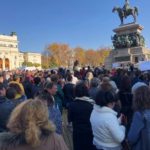NASHVILLE, Tenn.—Seventy percent of Protestant American pastors say religious liberty is on the decline in the United States, according to a survey from LifeWay Research.
Seven out of 10 senior pastors at Protestant churches in the United States agree with the statement, “Religious liberty is on the decline in America,” while 27 percent disagree. Self-identified evangelical pastors (81 percent) are more likely to agree than mainline pastors (47 percent).
 Click graphic for larger version. For full-size top-page graphic, click here.Researchers also asked pastors: “Many Christian leaders have talked about society being in a culture war. Regardless of how you feel about that terminology, how would you explain the current situation?”
Click graphic for larger version. For full-size top-page graphic, click here.Researchers also asked pastors: “Many Christian leaders have talked about society being in a culture war. Regardless of how you feel about that terminology, how would you explain the current situation?”
Nearly six in 10 (59 percent) said Christians are losing. One in 10 (11 percent) said the culture war already is lost, and a roughly equal number (10 percent) said Christians are winning the culture war. Evangelical pastors (79 percent) are more likely than mainline pastors (60 percent) to say Christians are losing or have lost the culture war.
Mainline pastors (30 percent) also are most likely to say they “don’t know” when asked about the culture war. By contrast, 13 percent of evangelicals say they don’t know. Overall, one in five pastors (19 percent) say they don’t know.
Shifts in culture and practice
Some of the unease about religious liberty is due to shifts in American culture and church practice, said Ed Stetzer, president of LifeWay Research.
In the 1960s, nearly two-thirds of Americans were Protestants. Today, they make up less than half the population, according to the General Social Survey. Fewer Protestants means less cultural power, Stetzer said.
In the past, he noted, Christians—and Protestants in particular—took for granted Americans would look to the church for guidance on moral issues. Churches were seen as good for society, and so they received special privileges—like exemptions from taxes and other laws, he said.
Sign up for our weekly edition and get all our headlines in your inbox on Thursdays
“Even if people did not go to church, they looked to the church,” Stetzer said.
That’s no longer the case, as the government and culture no longer defer to Protestant Christians, which makes pastors and their congregations nervous.
“They feel like in some ways there was a pact made at the founding of the country—between God and America,” he said. “That pact has been broken.”
Not all bad news
That’s not all bad news, Stetzer said.
“The fact that ‘Christian’ is not just a demographic category can have a positive side,” Stetzer said, as it means Protestants and other Christians have to be more active in living out their faith.
But it also has political and social consequences, as a sizable number of Protestants and other Christians run into conflicts with societal norms on issues like sexuality and marriage.
So, Stetzer asserted, Protestants and like-minded religious people have to think through a new strategy that defends their religious liberty but also acknowledges that conflict.
LifeWay researchers found similar concerns about religious liberty in a telephone survey of 1,001 Americans. More than half (54 percent) agree with the statement, “Religious liberty is on the decline in America.” About four in 10 (38 percent) disagree.
Half (50 percent) also agree with the statement: “Christians increasingly are confronted by intolerance in America today.” Thirty nine percent disagree. Researchers also found about a third of Americans (34 percent) say Christians complain too much about how they are treated.
Survey of 1,007 Protestant pastors
The telephone survey of 1,007 Protestant pastors was conducted Sept. 4-19, 2013. Researchers randomly drew the calling list from a stratified list of Protestant churches. The study weighted responses to reflect the geographic distribution and denominational groups of Protestant churches.
The telephone survey of 1,001 adult Americans was conducted Sept. 6-10, 2013, in English or Spanish. Researchers weighted responses by age, gender, education, race/Hispanic ethnicity, region and market size to reflect the population more accurately.
In both instances, the sample provides 95 percent confidence that the sampling error does not exceed plus or minus 3.1 percent. Margins of error are higher in sub-groups.














We seek to connect God’s story and God’s people around the world. To learn more about God’s story, click here.
Send comments and feedback to Eric Black, our editor. For comments to be published, please specify “letter to the editor.” Maximum length for publication is 300 words.